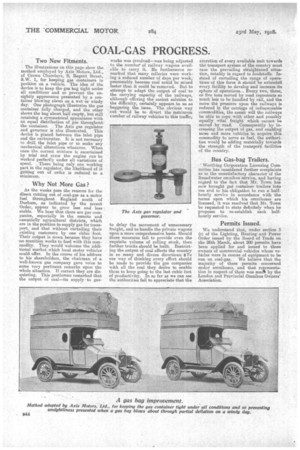COAL-GAS PROGRESS.
Page 20

If you've noticed an error in this article please click here to report it so we can fix it.
Two New Fitments.
The illustrations on this page show the method employed by Axis Motors, Ltd., of Crown • Chambers, '9, Regent Street, S.W. I, for keeping gas containers in position on a vehicle. The idea of the device is to keep the gas bag tight under all conditions and so prevent the unsightly appearance presented by a container blowing about on a wet or windy day. One photograph illustratesthe gas container fully charged, and the other shows the bag about half empty, but still retaining a symmetrical appearance with an equal distribution of gas throughout. the container. The Axis gas regulator and governor is also illustrated. This device is placed between the inlet pipe and the carburetter. It is not necessary to drill the inlet pipe or to make any mechanical alterations whatever. When once the correct mixture is ascertained by trial and error the engine can be worked perfectly under all variations of speed. There being only one working part in the regulator, the likelihood of it getting out of order is reduced to a minimum.
Why Not More Gas?
As the weeks pass the reasons for the direct cutting out of coal-gas as a motor fuel throughout England south of Durham, as indicated by the recent Order, appear to grow less and less stable. We hear that there are gas companies, especially in the remote and essentially agricultural districts, which are in the position to supply gas for transport, and that without curtailing their existing customers by one chbic foot. Their output is clown because they have -no munition works to feed with this commodity. They would welcome the additional market which local motor vehicles could offer. In the course of his address to his shareholders, the chairman of a well-known gas company gave voice to some very pertinent remarks upon the whole situation. If correct they are disquieting. This gentleman remarked that the output of coal—its supply • to gas
works was involved—was being adjusted to the number of railway wagons available to carry it. He furthermore remarked that many colleries were working a reduced number of days per week; presumably because coal could be mined faster than it could be removed. But to attempt to adapt the output of coal to the carrying capacity of the railways, although offering the easiest solution to the difficulty, certainly appears to us as beggaring the issue. The obvious way Out would be to divert the mascimuna number of railway vehicles to this traffic, to delay the movement of unnecessary freight, and to handle the private wagons upon a more comprehensive basis. Should these measures fail to provide even the requisite yolume of rolling stock, then further trucks should be built. Restricting the output of coal affects the country in so many and divers directions: t To our way of thinking every effort should be made to provide the gas companies with all the coal they desire to enable them to keep going to the last cubic foot of productivity. In so far as we can see the authorities fail to appreciate that the
accretion of every available unit towards the transport system of the country must ease the prevailing straightened situation, notably in regard to foodstuffs. Instead of curtailing the range -of operations of this force it should be extended every facility to develop and increase its sphere of operations.. Every two, three, or five tons moved by road represents so much less to be handled by rail, and the more the pressure upon the railways is reduced in the carriage of indispensable commodities, the easier will the railways be able to :cope with other and possibly equally vital freight which cannot-be moved by road. Consequently by increasing the output of gas, and enabling mose and more vehicles to acquire this commodity to serve as fuel, the authorities would be adding materially towards the strength of the transport facilities of the country.
Bus Gas-bag Trailers.
Worthing Corporation Licensing COMrnittee has considered further complaints as to the unsatisfactory eharactei• of the Broadwater omnibus service, and having regard to the fact that Mr. Town has now brought gas container trailers into use and to his obligation to run a halfhourly service in accordance with the terms upon which his omnibuses are licensed, it was resolved that Mr. Town be requested to state definitely when he proposes to re-establish such halfhourly service.
Permits Issued.
We understand that, under section 5 (c) of the Lighting, Heating and Power Order issued by the Board of Trade on the 26th March, about 200 permits have been applied for and issued to those owners of commercial vehicles whose vehicles were in course of equipment to be run on coal-gas. We believe that the majority of these permits concerned -motor omnibuses, and that representation in respect of them was mat by the London and Provincial Omnibus Owners' Association.






















